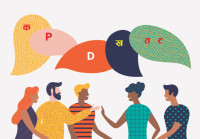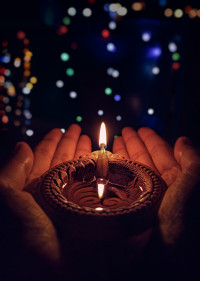As it is
Who deserves the hero’s cape?
The Covid pandemic has changed our perception of a hero but it remains to be seen whether the value we are attributing to frontliners nowadays is here to stay.
Edyta Stępczak
As Nepali climbers were making history being the first ever to ascent K2 [8.611m], the World’s second highest, one of the deadliest and technically most challenging mountain, in winter season, on the streets of Kathmandu a protest against the dissolution of the Parliament was being held. It was being led by doctor Govinda KC.
These are two very different cases, but with one common denominator: both Dr Govinda and the summiteers are all heroes, in their respective fields.
The profile of the hero has constantly been changing over the years. And those changes have been influenced, among other factors, by political circumstances, market trends, fears or popularity ratings. But at some point, when human interactions became one huge popularity contest, influencers and celebrities took over, making the term ‘hero’ almost obsolete.
During the golden era of space exploration, it was the astronauts and scientists who were making children’s eyes glow with excitement. As an American astrophysicist Neil deGrasse Tyson points out, what drove the young generation in his country in the 60s. was the space programme. It had the capacity to stir the imagination of millions, inspiring children and pushing them towards science to pursue the path of their heroes.
Those were then dethroned by other types of icons and admired figures: the stars of reality shows, bloggers or techies from Silicon Valley. Most recently, the (s)hero has a face of a teenage Swedish girl named Greta Thunberg.
Then came the Covid pandemic, which changed the paradigm in terms of who we perceive as a hero. And Banksy was there to confirm it with his drawing depicting a healthcare worker wearing a hero’s cape, an accessory reserved till now for Superman and Batman.
The year 2020 woke us up to a realisation what the term ‘essential worker’ really means, and that besides healthcare professionals it also includes garbage collectors. It made us see better than ever that along the way ‘glamorous’ got somehow mistaken for ‘essential’. And maybe it finally taught us, although the hard way, to respect those often omitted and diminished.
It remains to be seen whether the value we are prone to attribute to the frontline professions nowadays is here to stay.
CNN Heroes also contributed to that shift in our perception of a hero. This television special, created by the network in 2007, aims to honour those who make a difference in their societies. Someone we hoped will save us if needed, no longer was a fictitious figure with magical powers, but a flesh-and-blood individual. Those everyday people do their ‘magic’ equipped with integrity, persistence, courage and selflessness. Like Anuradha Koirala, a recipient of CNN Heroes Award in 2010.
As I argue in my book, Burqa in Nepal is called Sari, ‘the most crucial battle in Nepal is fought not in the so-called death zone in the Himalayas, but in the lowlands, where what is in stake is dignity and fundamental human rights, not a sports record’. The fight I had in mind writing it is the one led by activists and social workers, like Indira Ranamagar of Prisoner’s Assistance Nepal, Renu Sharma of The Women’s Foundation, and so many others. These are my personal (s)heroes.
But there is no need to dethrone anyone and replace them with someone else, rather to make the stage more inclusive and welcoming to different individuals to look up to. It’s better we have that stage crowded so that each of us can relate to our own figure of reference.
With their audacity and vision, those disruptors of all walks of life, ages, nationalities and genders take humanity to the next level, push the boundaries of our understanding on what is possible, transform what is into what should be, shape our dreams and inspire us to become a bit more like them.
The only difference is that in this diverse group of wonderful people who deserve to wear a cape, some are cheered and acclaimed, while others lack any public recognition whatsoever.




 13.12°C Kathmandu
13.12°C Kathmandu










